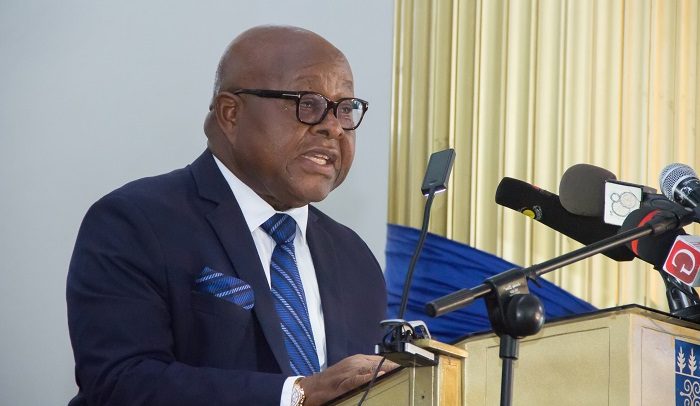Prof. Aaron Mike Oquaye
SPEAKER of Parliament, Prof. Aaron Mike Oquaye has donated half of his monthly salaries into the COVID-19 National Trust Fund after the House passed a bill to cloth the fund with legal backing to properly receive and regulate donations into it.
The move puts the number three gentleman in the national solidarity campaign initiated by President Akufo-Addo to galvanize resources from individuals, international, national and corpprate organisations to fight the coronavirus disease.
For the Speaker, this is not the time to enjoy but to save lives and that every individual needs to support the government at this crucial time to deal with the disease.
He called on all institutions and individuals to join the campaign by donating bountifully into the COVID-19 National Trust Fund to the best of their ability.
Since the proclamation by the President, organisations and individuals have been making donations to support the fight against the pandemic.
Parliament on Thursday late into the night passed the COVID-19 National Trust Fund, 2020 under a certificate of urgency during which the Speaker also announced a donation of GH?200,000 by Parliament to set the fund rolling.
The Attorney General and Minister of Justice, Gloria Afua Akuffo laid the bill before Parliament on the night of Wednesday April 1, 2020 to give legal backing to the establishment of the Covid-19 National Trust Fund which is intended to complement the efforts of government.
The Fund will receive donations for disbursement to individuals affected by the COVID-19 disease, and the bill makes provisions for how it should be managed by the trustees appointed by the President.
In recognition of the threat of COVID-19 to life and its potential to escalate in the country, President Akufo-Addo, on Wednesday, March 25, 2020, announced the establishment of a COVID-19 Trust Fund to galvanize support towards the fight against the pandemic
He introduced certain measures in response to the disease, including the passage of the Imposition of Restrictions Act, 2020 (Act 1012), which gives him the power to impose certain restrictions and other measures by an Executive Instrument intended to stop the importation of the virus, contain its spread, provide adequate care for the affected and limit the impact of the virus on social and economic life.
In specific terms, the measures include the declaration of COVID-19 as a public health emergency, the closure of borders, mandatory quarantine for fourteen days, testing of persons who entered the country from March 21, 2020, treatment of persons who tested positive for COVID-19 and other restrictions of movement of persons, including a partial lockdown.
By Ernest Kofi Adu, Parliament House


